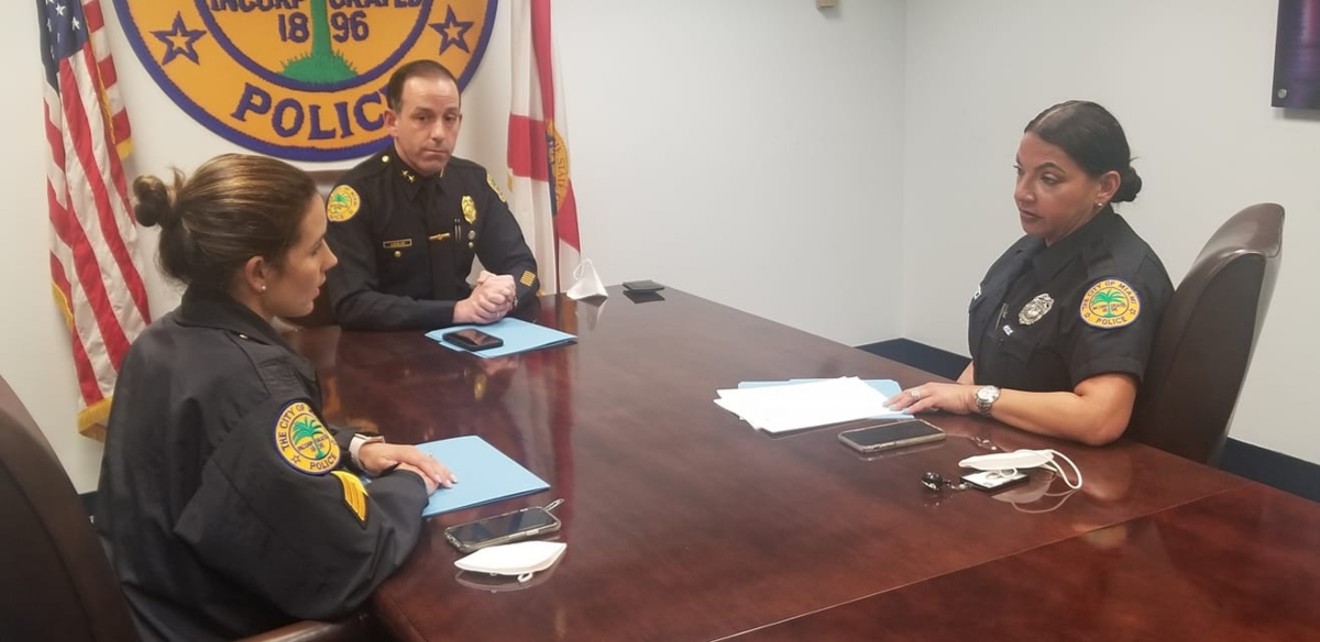Since 2001, the City of Miami's Civilian Investigative Panel (CIP) has probed complaints against Miami police officers ranging from basic discourtesy to overtime theft and coverups.
The oversight board and the Miami Fraternal Order of Police (FOP), the union that represents city law enforcement, have had a thorny relationship over the years. The union's former president, the shamelessly problematic Javier Ortiz, has railed against the panel's subpoena powers, called the CIP a waste of taxpayer money, and argued that it should be dissolved. And the Miami FOP's current leadership has expressed opposition to some police reforms.
Given that history, yesterday's announcement of an initiative between the Miami Police Department and the CIP — with the police union's backing — comes as a bit of a surprise. Even Mayor Francis Suarez said he had never seen the CIP and the union together at a press conference, much less agreeing on the same thing.
The mayor, the CIP, the police department, and the FOP introduced a conflict-resolution program that would address civilian complaints by putting the civilian and the officer in a room together with trained mediators. The initiative, called the Community-Police Mediation Program, is modeled after a New Orleans program with the same name, and it functions as an alternative to traditional complaint investigation and discipline processes. In Miami, the city commission unanimously voted in support of the program without discussion during a meeting yesterday.
During yesterday's press conference, Suarez said the program creates a "safe space" where officers and citizens "can reconcile, hopefully, their differences without getting to a more formal, more adversarial process" like an internal affairs or CIP complaint. (The police department's internal affairs unit disciplines officers. The CIP is independent and investigates misconduct complaints and recommends discipline.)Today in @CityofMiami we have committed to having the first, in the state of Florida, Community Police Mediation program. Press conference at 3pm at City hall will unpack the details of this collaborative effort. Tune in! pic.twitter.com/Fdh2qMee4l
— Rodney W. Jacobs Jr. (@rwjacobsjr) September 24, 2020
"This is a place where our officers can also feel free to say that they were wrong," Suarez said. "Or admit that something maybe didn't go right or the way that they expected, without fear of any sort of legal repercussions."
Rodney Jacobs, assistant director of the Miami CIP, says the mediation program has been in the works for about two years. According to Jacobs, about a quarter of the complaints the CIP receives are for discourtesy or low-level procedural violations. For example, civilians often file complaints with the CIP because an officer was rude during a traffic stop. Many of those complaints are closed with no finding because the complaints are generally "he said, she said," and the civilians have no evidence to back up their claims, Jacobs explains.
"The idea is that we can do more with these discourtesy cases than just close them as a ‘no finding,’" Jacobs says.
In mediation, an officer and a civilian can hear each other out. The cop could learn how to better engage with community members, and the civilian could ask for an explanation after a negative encounter with a police officer.
To go to mediation, a conflict-resolution case must meet certain requirements. Complaints related to discourtesy, neglect of duty, and bias-based policing on the part of police officers could be eligible for mediation. More serious complaints — like those related to use of force, sexual misconduct, false arrest, or any alleged criminal activity — would not be eligible. And if an officer has already mediated two citizen complaints in a year, the officer won't be allowed to go into mediation a third time.
"The officers that will benefit from this are the good cops that just have one of those chance encounters," says Tommy Reyes, president of the Miami FOP. "This isn't for someone that has 100 complaints on their file over their career. This is for someone who has few complaints. An officer that potentially could be a problem child will never see this program."
Reyes says the FOP is supportive of the mediation program.
"I think what this does is it frees both parties up to talk, speak their mind, and be honest with each other," Reyes says. "I can speak from personal experience there are many times when I've had issues with people on the street and I wish I can just sit them down and say, 'Hey, this is why I did what I did.'"
The mediation process is voluntary; both the officer and the civilian have to agree to take part. If either person declines to enter mediation, then the CIP and internal affairs would move forward with their investigations.
An officer can't be forced to enter mediation, but resolving an eligible complaint through mediation would benefit them. If a complainant agrees to go into mediation, they would be required to withdraw their formal complaint with the CIP or internal affairs.
"The carrot for an officer is if you go through the mediation process, you don't have to get an IA complaint in your file," Jacobs says.
An officer's personnel file would reflect that a complaint against them was resolved through mediation. But the mediation agreement and resolution won't be in the disciplinary record. Mediation proceedings will be kept private; both parties are required to sign confidentiality agreements.
An officer and a civilian might leave mediation still in disagreement, but as long as both parties made a good-faith attempt to understand each other and hash things out, the mediation is considered successful.
The proceedings will be led by two trained community mediators who will be chosen by members of the CIP and the police department. Mediators won't be hired as city employees, but they may be paid a stipend for their time.
According to Jacobs, the mediation will operate as a pilot program and will be evaluated every six months until a formal program is created. Reyes says training for mediators could start as soon as October. Applications for mediators will be posted on the City of Miami's website and the CIP website.












